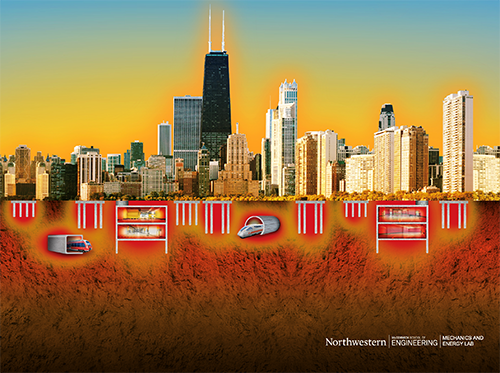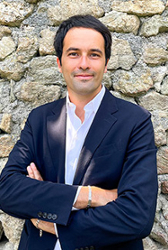Prof. Alessandro Rotta Loria Receives NSF CAREER Award

Professor Alessandro Rotta Loria, assistant professor of Civil and Environmental Engineering, has received a CAREER Award from the National Science Foundation.

In this project, Prof. Rotta Loria will investigate the mechanics of geological materials and geotechnical structures in the context of subsurface urban heat islands. Subsurface urban heat islands represent an underground climate change that is increasingly affecting most urban areas worldwide, with several documented issues for underground transportation infrastructure. This subsurface warming is caused by massive amounts of waste heat continuously rejected into the ground by buildings, infrastructures, and underground transport. These waste heat emissions present a silent threat for urban areas because the mechanics of geological materials such as soils is renowned for being highly sensitive to temperature variations, for example, through the phenomenon of thermally accelerated creep. Rotta Loria plans to fill the gaps in the current scientific understanding of this problem by developing an integrated set of experimental and theoretical investigations. These activities will leverage a unique sensing network that monitors temperature in the subsurface of Chicago and advanced laboratory experiments to formulate and validate physics-based and data-driven modeling tools. The ultimate goal of these investigations is to shed light on the fundamental scientific problem of creeping deformations of soils and geotechnical structures in the context of prolonged temperature rises – one that has many practical implications, even beyond the scope of subsurface urban heat islands. The findings of this research will be shared by Prof. Rotta Loria through educational associations with Northwestern, the Illinois Green Alliance, and the Chicago Museum of Science and Industry.
This latest endeavor of Prof. Rotta Loria falls within his broader research and educational program devoted to understand, characterize, and predict the mechanics of geological materials in the context of energy transfers, such as heat and electric current flows. Specifically, this research has the potential to shape a new area of study on subsurface urban heat islands and serve transformative strategies to plan, design, and manage city undergrounds. In particular, the achievement of a fundamental understanding of the mechanics of subsurface heat islands can help limit detrimental impacts and increase the resilience of the nation’s infrastructure and historic buildings. The deployment of shallow geothermal technologies could solve this by absorbing waste heat from the ground, limiting ground warming and the associated thermally induced deformations, and providing sustainable thermal energy supply to buildings. This work ultimately aims to support the development of sustainable and resilient built environments.
The National Science Foundation CAREER awards are awarded in support of junior faculty who exemplify the role of teacher-scholars through research, education, and the integration of education and research within the context of the mission of their organizations. Such awards come with a federal grant for research and education activities for five consecutive years.
